 Petzlover
Petzlover Bergamasco is originated from Italy but Estonian Hound is originated from Estonia. Bergamasco may grow 10 cm / 4 inches higher than Estonian Hound. Bergamasco may weigh 18 kg / 40 pounds more than Estonian Hound. Both Bergamasco and Estonian Hound has same life span. Both Bergamasco and Estonian Hound has almost same litter size. Both Bergamasco and Estonian Hound requires Moderate Maintenance.
Bergamasco is originated from Italy but Estonian Hound is originated from Estonia. Bergamasco may grow 10 cm / 4 inches higher than Estonian Hound. Bergamasco may weigh 18 kg / 40 pounds more than Estonian Hound. Both Bergamasco and Estonian Hound has same life span. Both Bergamasco and Estonian Hound has almost same litter size. Both Bergamasco and Estonian Hound requires Moderate Maintenance.
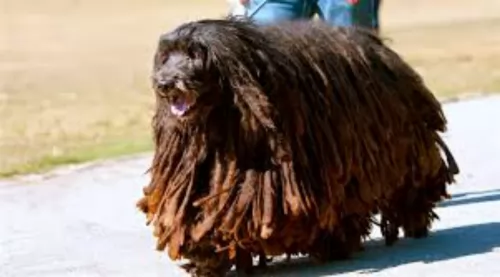 The Bergamasco comes from northern Italy. This medium sized sheepdog is of ancient origin. Known as an Italian sheep herding breed, his name actually comes from the town where he comes from - Bergamo.
The Bergamasco comes from northern Italy. This medium sized sheepdog is of ancient origin. Known as an Italian sheep herding breed, his name actually comes from the town where he comes from - Bergamo.
It was after World War II that there was danger that this breed would disappear as the need for herding and shepherding was diminishing. An Italian breeder, however, Dr. Maria Andreoli, stepped in to save the breed.
It was in 2015 that the American Kennel Club also changed the breed’s status from Miscellaneous to the Herding Group.
 In 1947, the Estonian Hound was developed and remains today the only pure breed ever developed in Estonia. At that time the national economic minister of the Soviet Union declared that every country in the USSR must have a national dog breed. Thus, the Estonian Hound and the Estonian Kennel Union were born. The Kennel Union is currently seeking breed recognition from the Federation Cynoloqique Internationale.
In 1947, the Estonian Hound was developed and remains today the only pure breed ever developed in Estonia. At that time the national economic minister of the Soviet Union declared that every country in the USSR must have a national dog breed. Thus, the Estonian Hound and the Estonian Kennel Union were born. The Kennel Union is currently seeking breed recognition from the Federation Cynoloqique Internationale.
The Estonian Hound came from breeding local Estonian hunting dogs with several different breeds of foreign dogs. The Soviet decree also established that hunting dogs had to be no more than 17 inches high. This result in a hunting dog with great agility and drive that is extremely popular in now inependent Estonia. It is the national dog.
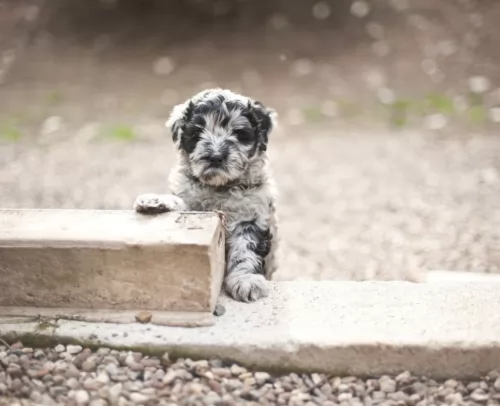 This medium sized sheepdog stands 54 – 62cm in height and weighs up to 38 kg as an adult. It is his coat which draws the most attention. It is of a coarse texture and actually greasy to the touch. It actually forms into strands or almost like dreadlocks from the top of the body, so that people agree he is one of shaggiest dog breeds there are.
This medium sized sheepdog stands 54 – 62cm in height and weighs up to 38 kg as an adult. It is his coat which draws the most attention. It is of a coarse texture and actually greasy to the touch. It actually forms into strands or almost like dreadlocks from the top of the body, so that people agree he is one of shaggiest dog breeds there are.
From age 1 on the coat starts to become woolly, and then the flocks start to form. As these clumps of hair appear, it will become necessary to separate them into smaller cords by hand to ensure attractive formation Brushing isn’t necessary but a big toothed comb can keep their hair ‘groomed’.
The colour of the coat is solid grey with patches of shades of grey and sometimes black. His dense, heavy coat makes it that he is suited to cooler climates. Because he is a herding dog, he wouldn’t do well in an apartment but would suit a home with a large garden.
He is intelligent and social but will need firm handling as he is a boisterous dog. He has a muscular yet compact body with a large head, long tail, high-set semi-drooping ears and large, gentle looking brown eyes. Although not instinctively aggressive, he makes an excellent watch dog with strong protective instincts to protect his human family.
He views new people into his circle with suspicion and wariness. He is good with kids and pets in the home and is playful and energetic.
 The Estonian Hound is a strong, muscular body of medium size, with well-developed muscles and strong bones. It has a straight muzzle and skull with defined eyebrows and long drop ears. They have black noses and dark eyes. Their back is wide and straight, and their chest is deep and wide. They have skin that is tight with no wrinkles or folds anywhere.
The Estonian Hound is a strong, muscular body of medium size, with well-developed muscles and strong bones. It has a straight muzzle and skull with defined eyebrows and long drop ears. They have black noses and dark eyes. Their back is wide and straight, and their chest is deep and wide. They have skin that is tight with no wrinkles or folds anywhere.
The Estonian Hound is double coated, but the undercoat is not well developed. The top coat is rough, short and shiny. The tail has a thick covering of hair. The color is usually white with red patches, black or brown patches or yellow patches.
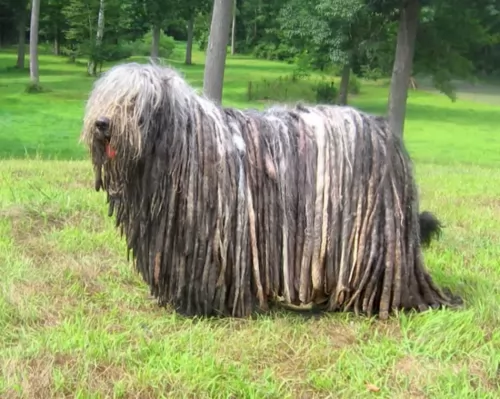 This is a working dog so they are naturally alert. He is also intelligent and independent and this independence is seen with training as he doesn’t take easily to following instructions, becoming stubborn. You’ll certainly want to have your Bergamasco socialized and trained as he can be a boisterous dog, bounding with energy.
This is a working dog so they are naturally alert. He is also intelligent and independent and this independence is seen with training as he doesn’t take easily to following instructions, becoming stubborn. You’ll certainly want to have your Bergamasco socialized and trained as he can be a boisterous dog, bounding with energy.
This is a dog that will need to be kept busy and provided with plenty of activities so that he remains happy, playful and relaxed.
Lively and intelligent, these dogs also form strong bonds with their owners and get on well with the children in the home. He will take well to country life as opposed to living in the city.
 The Estonian Hound is a happy dog and loves to play with children. He was bred to hunt though and he can get fixated on a scent and knock over a small child.
The Estonian Hound is a happy dog and loves to play with children. He was bred to hunt though and he can get fixated on a scent and knock over a small child.
He is a hunting dog with great agility and drive.
He has had to be adaptable through his short history and is now more a companion than a hunting dog. He can live in the city or country.
He is intelligent and trainable. He is lively and energetic and the challenge might be keeping his attention long enough to train.
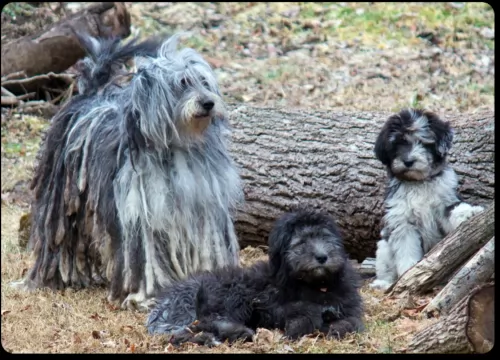 Your Bergamasco can live to be 13 to 15 years of age and he is considered to be a healthy breed. Nonetheless you want to be aware of health issues that are common to this breed
Your Bergamasco can live to be 13 to 15 years of age and he is considered to be a healthy breed. Nonetheless you want to be aware of health issues that are common to this breed
he is vulnerable to heat. He can die of heat exhaustion quicker than other breeds
keep an eye on him for hip dysplasia, progressive retinal atrophy and skin allergies
 With such a young breed there have not been any studies done on their health or genetic issues. It seems the breed is fairly healthy but there is too little information to really say. Being confined to Estonia there has been little commercial or backyard breeding. He is less likely than most pure breeds to have genetic issues.
With such a young breed there have not been any studies done on their health or genetic issues. It seems the breed is fairly healthy but there is too little information to really say. Being confined to Estonia there has been little commercial or backyard breeding. He is less likely than most pure breeds to have genetic issues.
It is likely that dogs of his type are at risk for:
Caused by excessive exercise before or after having eaten a large meal. It is suggested that you feed your English Setter twice a day, smaller meals and not right before or after strenuous exercise.
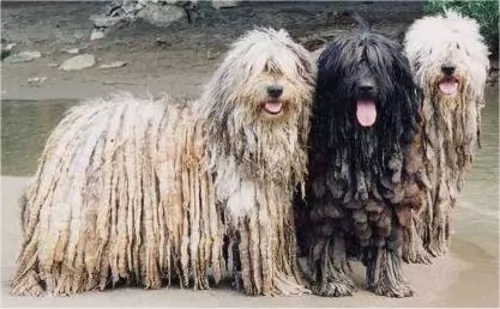 The Bergamasco isn’t a shedder but his coat will need to be combed once a week just to keep it in order. You don’t want to bath him too often, especially during the Winter as his coat takes a long time to dry. It isn’t recommended to shave a Bergamasco as the coat regulates the dogs temperature – keeping him warm and cold as the weather demands.
The Bergamasco isn’t a shedder but his coat will need to be combed once a week just to keep it in order. You don’t want to bath him too often, especially during the Winter as his coat takes a long time to dry. It isn’t recommended to shave a Bergamasco as the coat regulates the dogs temperature – keeping him warm and cold as the weather demands.
They thrive on a blend of kibble (dry) mixed with raw and-or moist food once or twice a day. Remember to include quality chicken, turkey, etc. mixed with some vegetables and rice into your dog’s diet. Ensure a constant supply of fresh water in an easily-cleanable bowl.
Balls and ropes are important for building muscle strength and burning energy. Remember your Bergamasco is a working breed and will need plenty of games and exercise.
 Feed a high quality dry food made for puppies. Feed ¼ to ½ cup per day in 2-3 meals for the first six months.
Feed a high quality dry food made for puppies. Feed ¼ to ½ cup per day in 2-3 meals for the first six months.
Feed 1 to 2 cups in two meals from 6 months to a year or so.
Feed about 2 to 3 cups in two meals.
As previously mentioned this seems to be a fairly healthy breed.
Be careful not to feed a large meal before or after exercise due to possibility of bloat.
Check their ears and clean them periodically.
The Estonian Hound is a hunting dog and needs a good deal of exercise – at least an hour and a half every day or a long walk if not used for hunting. He is a working dog with a lot of energy and stamina. Don’t let him off leash though or he will follow his nose and take off. He is usually calm and quiet indoors if he gets enough physical and mental stimulation outdoors. He can be destructive and loud, nervous and hyper if he doesn’t. They enjoy Frisbee, agility, tracking and of course hunting.